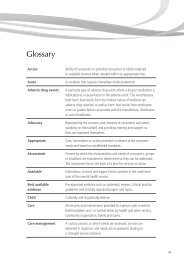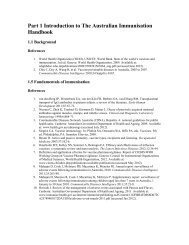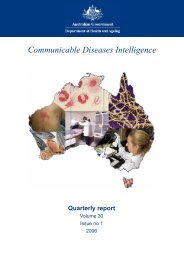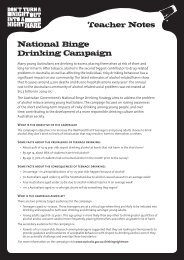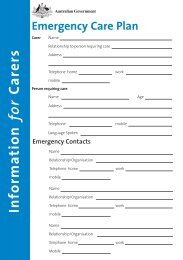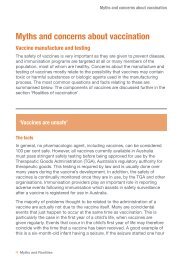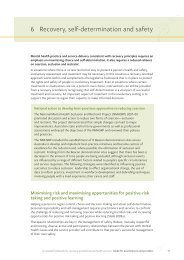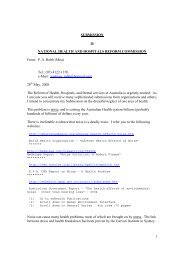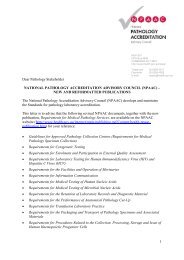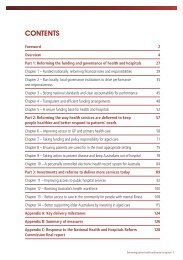National Amphetamine-Type Stimulant Strategy Background Paper
National Amphetamine-Type Stimulant Strategy Background Paper
National Amphetamine-Type Stimulant Strategy Background Paper
You also want an ePaper? Increase the reach of your titles
YUMPU automatically turns print PDFs into web optimized ePapers that Google loves.
40<br />
Psychiatric problems appear to occur predominantly among dependent methamphetamine<br />
users, rather than among those who take the drug infrequently. To further illustrate this,<br />
a recent Australian conference was presented with research conducted with a large<br />
community sample of amphetamine users in Queensland (Conroy, 2006). It was noted that<br />
42% of those who were amphetamine dependent, compared to 21% of non-dependent<br />
amphetamine users, had recently experienced moderate to severe mental health disability.<br />
Overall, dependent users had higher levels of depression and anxiety, more easily lost their<br />
temper and had poor relationships.<br />
Based on their own research and a review of the literature, McKetin and Mattick (1997)<br />
concluded that:<br />
Dependence on amphetamine has been associated with poor psychological health,<br />
especially in younger individuals who frequently use large amounts of amphetamine….<br />
Psychological problems reported by amphetamine users included feeling scattered,<br />
vague, distracted and problems with concentration that impeded work performance or<br />
study….The results of this study show that severely dependent amphetamine users<br />
suffer from poor memory and concentration, performing from half to one standard<br />
deviation worse on WMS-R indices than less dependent amphetamine users. This study<br />
also found preliminary evidence that a history of heavy amphetamine use, particularly<br />
injecting more than 3-4 days per week, was associated with impairment of visual<br />
memory tasks (pp.235, 240).<br />
3.4 Negative physical health effects<br />
ATS use in the short term can lead to increases in heart rate, hypertension, irregular body<br />
temperature and rates of breathing, constriction of blood vessels and cardiac arrhythmia<br />
(Lineberry & Bostwick, 2006; Maxwell, 2005). Short- and long-term ATS use can impact<br />
on the cardiovascular system (increasing heart rate, increasing blood pressure, cause<br />
arrhythmia and palpitations) sometimes resulting in cardio and/or cerebrovascular crises,<br />
such as myocardial infarction or stroke, aneurysm and hemorrhage (e.g., Buxton &<br />
McConachie 2000; Hung et al., 2003). Acute coronary syndrome is common in patients<br />
hospitalised for chest pain after methamphetamine use (Turnipseed et al., 2003).<br />
ATS can impact on the ability to regulate body temperature in a changing environment,<br />
contributing to hyperthermia, and metabolic disturbances are not uncommon (see Gowing<br />
et al., 2002). Methamphetamine induces dose-dependent brain hyperthermia that precedes,<br />
and is greater than, overall body hyperthermia, suggesting methamphetamine-induced<br />
neuronal activation is a contributing source of that hyperthermia (Brown et al., 2003). ATS<br />
suppress the appetite, and can be associated with weight loss and general poor nutrition.<br />
Less common problems include renal and hepatic problems (see Allen & Tresidder, 2003;<br />
Gowing et al., 2002; Maxwell, 2005). Maxwell (2005) also reported that many longer–term<br />
ATS users experience a range of health problems that adversely affect their general well<br />
being. Such problems include: poor dental hygiene including damaged and discoloured<br />
teeth from dry mouth, heavy sugar intake and tooth grinding; appearing older than<br />
chronological age; and skin lesions – excoriations and ulcers from parasitosis.<br />
As indicated earlier, evidence suggests that ATS impact on cognition and this may be



